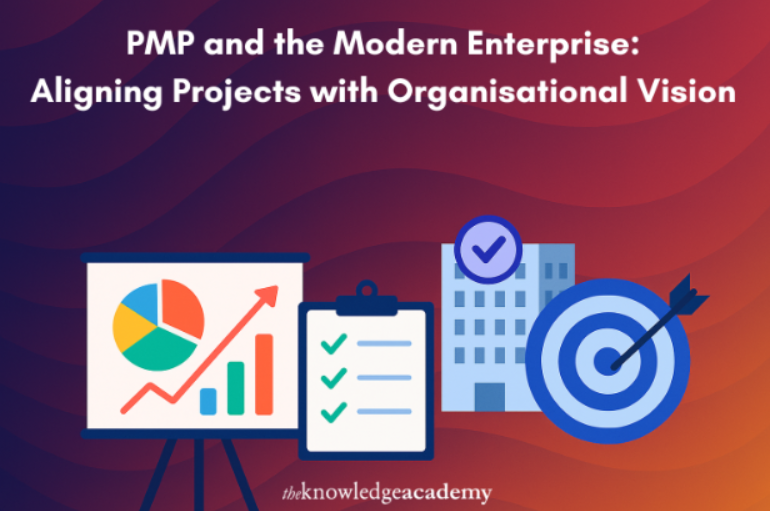What makes some project managers align effortlessly with their company’s bigger picture while others just tick boxes and chase deadlines? Is it just experience or something more intentional? Many professionals are now turning to PMP Courses to sharpen not just their technical skills but also their ability to connect delivery with strategy.
When comparing PRINCE2 vs PMP, it often comes down to which one better equips you to influence outcomes at an enterprise level. It is not just about managing projects. It is about managing purpose. Let us explore how PMP can help modern enterprises align every project with their broader vision.
Table of Contents
- Understanding the Modern Enterprise Vision
- How PMP Builds Strategic Alignment
- Key Skills That Bridge Strategy and Execution
- Conclusion
Understanding the Modern Enterprise Vision
Many businesses today have complex, multi-layered objectives. Their goals are to generate new ideas, compete, grow in a manner that is environmentally friendly, and streamline their internal processes. They set a clear vision, which is a long-term image of what they aim to achieve, to keep everyone in the company aligned.
This vision serves as a guide for making informed choices, allocating resources effectively, and initiating new projects. However, for it to work in real life, it needs to be supported by projects that align with it.
How PMP Builds Strategic Alignment
It is not just about being skilled in technical areas to obtain the PMP certification. It provides you with frameworks that directly link strategy and delivery. Here are some important methods that professionals trained in PMP use to ensure their strategies align with one another:
Clear Project Objectives That Reflect Business Goals
During the start phase, the PMP emphasises the importance of setting project goals. These goals are not just made up on the spot. They have a lot to do with business results, like starting a new service or making things run more smoothly. From the beginning, this clear communication makes sure that everyone on the project team knows what they need to do.
Prioritisation and Scope Management
The lack of rules about the scope is a major cause of failed projects. Managers who have taken the PMP course know how to keep the scope in check by using organised methods. This keeps people from getting distracted by things that don’t matter and makes sure that every task and deliverable helps reach the goals.
Stakeholder Engagement and Communication
Stakeholder analysis and engagement planning are part of the PMP strategy. Keeping important voices involved makes sure the project stays on track with the changing needs of the organisation. It also prevents surprises that arise late in the process, which can disrupt things.
Change Management Integration
Most businesses are always changing. It is possible to make changes without losing sight of the original vision, as the PMP methodology includes structured change control mechanisms.
Key Skills That Bridge Strategy and Execution
Projects only add strategic value when they are run by people who can think and act at both the tactical and strategic levels. PMP professionals acquire a set of skills that enable this.
Critical Thinking and Decision-Making
A project manager with a PMP certification knows how to analyse data, assess risks, and make informed decisions quickly. This competence helps the strategic goal of delivering on time, within the scope, and with clear advantages.
Risk and Issue Management
Businesses operate in settings that are not always clear. Leaders who have been educated in PMP identify risks early, determine how they will impact the project, and develop plans to keep everyone aligned. This proactive attitude keeps projects on track and useful for the business.
Value Delivery Focus
Businesses today want results that can be measured. PMP focuses on benefits realisation, which means that projects should not only provide outputs but also lead to good business results. This kind of thinking keeps you aligned with your strategic goals at all times.
Conclusion
Organisational vision is only strong when projects work to make it happen. Professionals who have been trained in PMP contribute structure, alignment, and focus that help make vision into measurable results. What makes them so valuable is that they can connect strategy intent with project execution. Consider The Knowledge Academy courses to gain a deeper understanding of how PMP can help your business achieve its goals.

